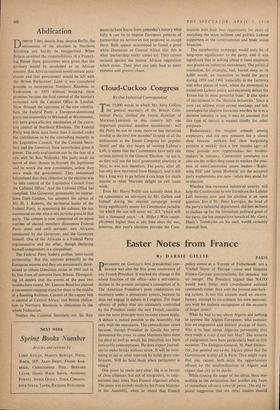Easter Notes from France
By DARSIE GILLIE
PARIS pRESIDENT DE GAULLE'S first presidential con- ference was also the first press conference of any French President. It marked the change in the whole function of the office—also a self-contra- diction in the present occupant's conception of it. The American President's press conferences are necessary under a democratic system, because he does not engage in debate in Congress. For those spheres of policy that are ultimately controlled by the President under the new French constitu- tion the same principle must to some extent apply. A debate is indeed possible in the Assembly, but only with the executants. The contradiction arises because, though President de Gaulle has never threatened the press, as some Ministers have done (in deed as well as word), his liberalism has been noticeably contemptuous. He does expect journal- ists to make bricks without straw. It will be inter- esting to see at what intervals he holds press con- ferences. Will he hold them when parliament is sitting?
One point he made very clear. He is in favour of close alliances, but not of integration, in inter- national (any more than Franco-Algerian) affairs. The point was already made by his Prime Minister in the Assembly, when he stated that French policy aimed at a 'Europe of Fatherlands' not a `United States of Europe'—close and frequent Franco-German conversations, for instance, but no merger. The President argued that NATO would work better with co-ordinated national commands rather than with the present interlock- ing system. Is not this attitude itself an unsatis- factory attempt to co-ordinate his own national- ism with his realistic recognition of the necessity of larger units?.
What he had to say about Algeria did nothing to appease the Algiers Europeans, who consider him an ungrateful and disloyal protege of theirs. Was it to hear about Algerian personality that they made a coup d'etat last May? The screams of indignation have been particularly loud on this occasion. The Delegate-General, M. Paul Delouv- rier, has pointed out to the Algiers ultras that the Government is after all in Paris. They might reply that you cannot both seize the opportunities offered by the insubordination of Algiers and expect that city to be docile.
While rousing the anger of the ultras, there was nothing in the declaration that justifies any hope of immediate advance towards peace, The old re- jected suggestion that the rebel leaders should come and talk to the President in Paris stands, but unfreshened. There is reason to think that the un- official contacts that had been established in 1958 have not been renewed. Possibly the President is anxious not to anger the army, since the hostility to him of the Algiers ultras is only likely to become dangerous to him if last year's alliance of the ultras and the army is renewed.
The army claimed two successes last week, one probably unreal, the other real. The first is the surrender of a. rebel leader with 150 men, who came over the Tunisian border to give themselves up. After the fiasco of an attempt to negotiate a local surrender through a captured rebel officer who used the opportunity to return to his unit, the army was delighted to be able to claim that its hopes of a piecemeal end to the rebellion was a reality. Alas, the surrendering rebels seem to be all that was left of a faction within the Algerian army in Tunisia that had already been mastered by the rebel 'government.' Their surrender to the French will only confirm' the rebel government's thesis that all dissidents are traitors deserving death.
On the other hand, the death in combat of `Colonel' Amirouche, the commander of all rebel forces in Kabylia, is a grave loss to them. This arrogant, heroic, ruthlessly brutal man had been hunted in vain by considerable forces under three well-known generals. He had become a legendary and terrifying figure on both sides. He will be very hard to replace. His death will certainly strengthen the arguments of those French officers who insist that 'now' is less than ever the moment for seeking contact with the rebel leaders.
The forthcoming Algerian municipal elections will be particularly interesting. So far President de Gaulle's attempt to replace bullets by ballots has been defeated by the extremists of both sides. If a beginning of real representation can be achieved this month, however fragmentary, there will again be a thread of hope for the fingers to follow even if the thread is nearly invisible to the eye.
Finally, it should perhaps be noted that Presi- dent de Gaulle used his press conference to remind parliament again that he can dissolve it—in other words, that he is less troubled by the shift of opinion at the municipal elections than are many of his insubordinate followers.



































 Previous page
Previous page